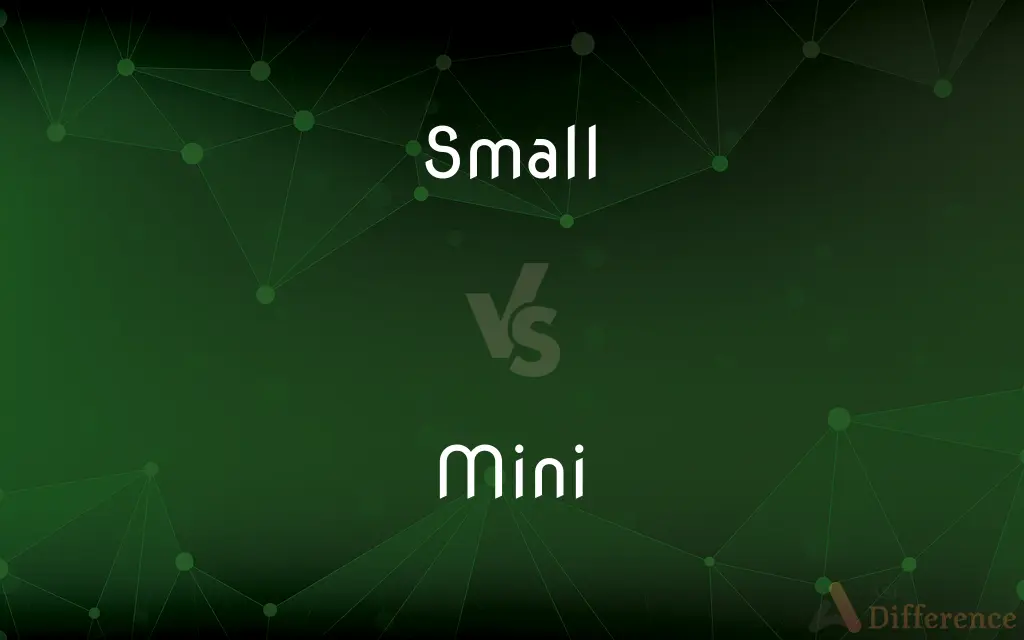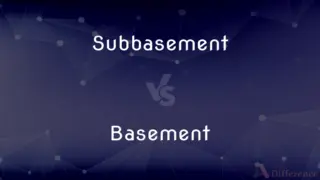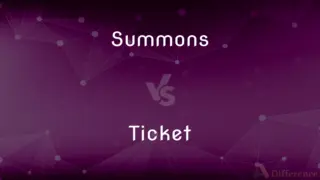Small vs. Mini — What's the Difference?
Edited by Tayyaba Rehman — By Fiza Rafique — Updated on March 11, 2024
"Small" denotes something of limited size relative to others of its kind, while "mini" suggests a version significantly reduced in size, often implying compactness or miniature form.

Difference Between Small and Mini
Table of Contents
ADVERTISEMENT
Key Differences
"Small" is a relative term used to describe the size of an object, entity, or concept, indicating that it is smaller than others in its category or than the average. It's a general term that can apply across various contexts, from physical objects to abstract concepts. On the other hand, "mini" conveys a more specific size implication, denoting something that is notably smaller than the standard or most common size. It often suggests a reduction in size that makes the item more compact, portable, or convenient, and is sometimes used to denote a version of something that retains the functionality or characteristics of the original but in a significantly smaller form.
While "small" serves as a comparative descriptor without necessarily implying a drastic reduction in size or functionality, "mini" often highlights a deliberate design choice to minimize dimensions, frequently for reasons of convenience, novelty, or portability. For instance, a "small car" refers to a car that is smaller than average cars, perhaps in length, width, or height, but a "mini car" suggests a car that is significantly reduced in size, possibly to the extent that it offers a different experience or functionality compared to regular-sized cars.
In usage, "small" is more versatile and can describe a wider range of sizes and degrees of smallness. It can be used in both formal and informal contexts without much specificity regarding the extent of size reduction. "Mini," however, carries a connotation of being especially small or reduced, often in a way that is noticeable or distinctive. It's commonly used in marketing and product naming to highlight the compact nature of products, such as "mini-fridge" or "mini-golf," where the size is a defining characteristic.
The choice between "small" and "mini" can also reflect the speaker's perspective or the cultural context, with "mini" sometimes implying a certain charm or appeal due to the compactness. Meanwhile, "small" is a more neutral term that simply states a fact about size without additional connotations of appeal or functionality.
Although both terms relate to size, the context in which they are used can significantly affect their implications. For example, in technology and consumer products, "mini" often suggests not just a smaller size but also a focus on maintaining or adapting functionality in a more compact form, whereas "small" might be used more broadly without specific expectations regarding functionality or design.
ADVERTISEMENT
Comparison Chart
Definition
Of limited size, smaller than others
Significantly reduced in size
Connotation
General diminutiveness, comparative
Compactness, notable reduction
Usage Context
Broad, versatile across categories
Often implies special design or purpose
Functionality
Implied relative to size
Suggests maintained functionality
Cultural Implication
Neutral, factual
Can imply charm, novelty, or innovation
Compare with Definitions
Small
Minor in importance.
It's a small issue. easily fixed.
Mini
Compact and portable.
The mini printer can easily fit in a backpack.
Small
Low in quantity.
The store has a small selection of products.
Mini
Reduced form but functional.
They rented a mini-excavator for the garden work.
Small
Lesser in size.
She lives in a small apartment.
Mini
Significantly smaller version.
She bought a mini version of her favorite perfume.
Small
Limited in degree.
He had a small advantage in the race.
Mini
Denoting a smaller scale.
The children love playing mini-golf on weekends.
Small
Not extensive.
They made a small change to the recipe.
Mini
Designed for convenience.
His new phone is a mini model. very easy to carry.
Small
Being below average in size
A small car.
Mini
The Mini is a two-door compact city car that was produced by the British Motor Corporation (BMC) and its successors from 1959 until 2000. The original Mini is considered an icon of 1960s British popular culture.
Small
Being below average in quantity or extent
A small donation.
A small project.
Mini
Denoting a miniature version of something
A mini camera
Small
Limited in importance or significance; trivial
A small matter.
Mini
A very short skirt or dress
A leather mini
Small
Having limited position, influence, or status; minor
"A crowd of small writers had vainly attempted to rival Addison" (Thomas Macaulay).
Mini
Short for minicomputer
Small
Unpretentious; modest
Made a small living.
Helped the cause in my own small way.
Mini
Something that is distinctively smaller than other members of its type or class.
Small
Not fully grown; very young
A small child.
Mini
A miniskirt.
Small
Narrow in outlook; petty
A small mind.
Mini
Miniature, tiny, small.
Small
Having been belittled; humiliated
Their comments made me feel small.
Mini
Abbr of miniskirt
Small
Diluted; weak. Used of alcoholic beverages.
Mini
(dated) minicomputer
Small
Lacking force or volume
A small voice.
Mini
Abbr of miniature
You can add to the realism by painting your minis accurately.
Small
Lowercase
Type the password in small letters.
Mini
A very young dancer.
Small
In small pieces
Cut the meat up small.
Mini
Used of women's clothing; very short with hemline above the knee;
A mini dress
Miniskirts
Midiskirts
Wore her dresses midi length
Small
Without loudness or forcefulness; softly.
Small
In a small manner.
Small
A part that is smaller or narrower than the rest
The small of the back.
Small
Small things considered as a group.
Small
Chiefly British Small items of clothing.
Small
Not large or big; insignificant; few in number.
A small serving of ice cream.
A small group.
He made us all feel small.
Small
(figuratively) Young, as a child.
Remember when the children were small?
Small
Minuscule or lowercase, referring to written or printed letters.
Small
Humiliated or insignificant.
The bullies had succeeded in making him feel small.
Small
Evincing little worth or ability; not large-minded; paltry; mean.
Small
Not prolonged in duration; not extended in time; short.
A small space of time
Small
Synonym of little
Small science
Small
(archaic) Slender, gracefully slim.
Small
That is small the manufactured size.
I'll have a small coffee, thanks.
Small
In a small fashion
Small
In or into small pieces.
Small
(obsolete) To a small extent.
Small
(obsolete) In a low tone; softly.
Small
An item labelled or denoted as being that size.
Two smalls and a large, please.
Small
One who fits an item of that size.
Small
Any part of something that is smaller or slimmer than the rest, now usually with anatomical reference to the back.
Small
To make little or less.
Small
(intransitive) To become small; to dwindle.
Small
Having little size, compared with other things of the same kind; little in quantity or degree; diminutive; not large or extended in dimension; not great; not much; inconsiderable; as, a small man; a small river.
To compareGreat things with small.
Small
Being of slight consequence; feeble in influence or importance; unimportant; trivial; insignificant; as, a small fault; a small business.
Small
Envincing little worth or ability; not large-minded; - sometimes, in reproach, paltry; mean.
A true delineation of the smallest man is capable of interesting the greatest man.
Small
Not prolonged in duration; not extended in time; short; as, after a small space.
Small
Weak; slender; fine; gentle; soft; not loud.
Small
In or to small extent, quantity, or degree; little; slightly.
Small
Not loudly; faintly; timidly.
You may speak as small as you will.
Small
The small or slender part of a thing; as, the small of the leg or of the back.
Small
Smallclothes.
Small
To make little or less.
Small
The slender part of the back
Small
A garment size for a small person
Small
Limited or below average in number or quantity or magnitude or extent;
A little dining room
A little house
A small car
A little (or small) group
A small voice
Small
Limited in size or scope;
A small business
A newspaper with a modest circulation
Small-scale plans
A pocket-size country
Small
Low or inferior in station or quality;
A humble cottage
A lowly parish priest
A modest man of the people
Small beginnings
Small
Not fully grown;
What a big little boy you are
Small children
Small
Too small to be seen except under a microscope
Small
Not large but sufficient in size or amount;
A modest salary
Modest inflation
Helped in my own small way
Small
(of a voice) faint;
A little voice
A still small voice
Small
Made to seem smaller or less (especially in worth);
Her comments made me feel small
Small
Lowercase;
Little a
Small a
E.e.cummings's poetry is written all in minuscule letters
Small
Have fine or very small constituent particles;
A small misty rain
Small
On a small scale;
Think small
Common Curiosities
What makes something "mini"?
Something is "mini" when it is notably smaller than the standard size, often designed to be compact or portable while maintaining functionality.
What role does design play in "mini" products?
Design is crucial in "mini" products, focusing on reducing size without significantly compromising functionality or appeal.
How does "mini" affect product perception?
"Mini" often enhances product perception by suggesting convenience, portability, or innovative design, making the product appealing for its compactness.
How do "small" and "mini" impact environmental perception?
Both terms can positively impact environmental perception, with "small" implying less resource use and "mini" suggesting efficiency and innovation in design.
Can "small" and "mini" be used interchangeably?
While sometimes used interchangeably, "mini" specifically denotes a significant reduction in size, often with a focus on compactness or novelty, unlike the more general "small."
Is a "mini" version always functional?
A "mini" version typically aims to maintain the original's functionality in a more compact form, though specific features might vary.
Can services, not just products, be "mini"?
Yes, services can also be "mini," offering a scaled-down or more focused version of standard services, emphasizing efficiency or specialization.
What does "small" imply?
"Small" implies a size that is lesser than average or others of its kind, focusing on comparative diminutiveness.
How do cultural contexts influence the use of "small" vs. "mini"?
Cultural contexts can shape the perception of these terms, with "mini" often associated with novelty or charm in certain cultures, while "small" is a more universally understood descriptor of size.
Are there industries where "mini" is more commonly used than "small"?
Yes, industries focusing on technology, consumer electronics, and leisure activities often prefer "mini" to highlight compactness and innovation.
Share Your Discovery

Previous Comparison
Subbasement vs. Basement
Next Comparison
Summons vs. TicketAuthor Spotlight
Written by
Fiza RafiqueFiza Rafique is a skilled content writer at AskDifference.com, where she meticulously refines and enhances written pieces. Drawing from her vast editorial expertise, Fiza ensures clarity, accuracy, and precision in every article. Passionate about language, she continually seeks to elevate the quality of content for readers worldwide.
Edited by
Tayyaba RehmanTayyaba Rehman is a distinguished writer, currently serving as a primary contributor to askdifference.com. As a researcher in semantics and etymology, Tayyaba's passion for the complexity of languages and their distinctions has found a perfect home on the platform. Tayyaba delves into the intricacies of language, distinguishing between commonly confused words and phrases, thereby providing clarity for readers worldwide.
















































